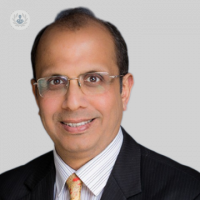Weight loss surgery: is body contouring necessary after?
Written by:When it comes to embarking on a weight loss surgery journey, you may have many burning questions such as: why is it important to lose weight before the procedure, how much can you eat after the operation and whether you need body contouring surgery to remove excess skin.
One of our top surgeons Mr Sanjay Agrawal performs between 100-150 weight loss surgeries a year together in his private practice and on the NHS. Here, we took the opportunity to ask Mr Agrawal these questions and more to help you understand how bariatric surgery works.

Why is it recommended to lose weight before having weight loss surgery?
Normally, anatomically the stomach is covered by the liver and for the surgeon to perform the surgery safely, we have to retract the liver (pull it up). We advise patients to follow the liver shrinkage diet for around 1-4 weeks before surgery, depending on their BMI. The bigger the BMI, the longer the duration of the diet.
The liver shrinkage diet is a low-calorie diet where the patient eats less than 1,000 calories per day (800-900) in order to shrink the liver. The dietician in my team advises the patient on the type and duration of liver diet that is appropriate for their individual case.
What are your pre-weight loss surgery tips?
It is always good to keep mobile with daily walks up until the day of surgery to avoid complications such as deep vein thrombosis (DVT) following weight loss surgery. It is not preventative of DVT but it is precautionary and ensures that there is no clot sitting in the leg before the operation.
How do I know if bariatric surgery is for me?
This is very individual and depends on multiple circumstances. The variables that influence the decision to operate on the patient includes whether they have a sweet vs. savoury tooth, if they are a volume eater or if they prefer to snack if they have reflux symptoms, diabetes and their BMI.
The commonest weight loss surgery procedure performed worldwide is the sleeve gastric at present, the second is the gastric bypass, and the least is the gastric band. However, just because the sleeve gastric is the most performed, it does not necessarily mean that it is the right choice for your circumstance, which will be discussed with your specialist.
How fast do you lose weight with bariatric surgery?
It varies with the type of surgery. With a gastric sleeve and gastric bypass, patients tend to lose weight the fastest and achieve their weight loss goal within a year. With the gastric band, however, this can take up to three years to reach their goal weight.
How much food will I be able to eat afterwards?
Depending on which surgery has been performed, patients typically won’t be able to eat more than a ‘baby plate’ at one time, which equates to a quarter of their normal plate.
Who would I work alongside following the operation?
The dietician is the most important member of my team, who will see the patient just before and multiple times after surgery. Patients will also review with a specialist nurse before and after surgery. A psychological review is offered where it is necessary in cases of people with eating disorders, where they eat more than others.
Would I need plastic surgery to remove sagging skin?
Not everybody will need body contouring surgery, however, if it is necessary for a particular person it should be performed 18 months to 2 years after primary surgery. Weight loss will plateau at some stage, but you don’t want to have surgery too soon as you may still lose more weight in the second year. If you lose more weight after contouring surgery, you may have more sagging skin again, which is why it is better to wait.
How likely is it to regain weight after surgery?
Any of the weight loss surgeries are a tool and they only work if the patient works with them for the rest of their life. Hence, if a patient goes back to an unhealthy diet and sedentary lifestyle, they can regain the weight. After the procedure, you will still have to work with the surgery.
My team are there for two years to set you up with the tools and habits that need to be adopted as a lifelong change. We also run a closed Facebook group to support our patients both in the short and long term, and it is a place where patients can help and share with others on a similar journey.
How are your patients doing now?
Overall, more than 90% of patients do very well after surgery. There are some who may have gained or not lost enough weight but the majority are doing very well.
If you would like to discuss your weight loss surgery options, do not hesitate to have the first consultation with Mr Agrawal.


